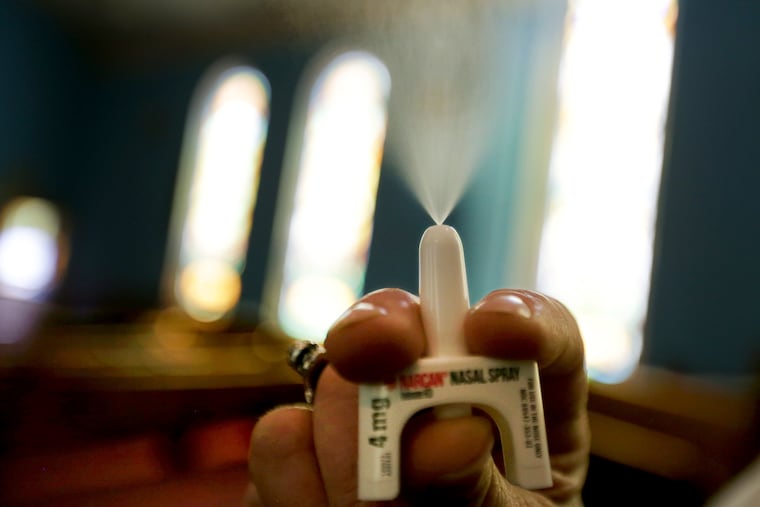Overdoses rise during the holidays, and this year could be especially tough. Experts urge caution.
Philadelphia encourages all residents to keep a stock of naloxone, the opioid-overdose reversing drug, in their homes, especially during the holidays.

From navigating parties to fielding questions about recovery and substance use, the holidays can be especially stressful for people in recovery or those still in active addiction. This year, as somewhat-normal celebrations resume after a life-altering pandemic, the threat level may be even higher.
Increased stress, health officials say, may add to the seasonal uptick in overdoses that the Philadelphia area normally sees. Though it’s hard to say exactly what’s behind the spike, harm reductionists say people who use drugs, or who are in recovery, should be especially cautious during the holidays for a number of reasons.
» READ MORE: Drug deaths soared in 2020, especially affecting Black Philadelphians
“The holidays are a difficult time for a lot of individuals. Especially with people in recovery, they’re struggling with their own mental health,” said Destinie Campanella, a harm reduction coordinator with the city’s health department.
At Caron Treatment Centers, an addiction treatment program with locations in Philadelphia and its suburbs, patients newly in recovery often worry about questions they’ll field from family members during the holidays, and how they’ll answer.
“It’s something we process extensively — how do I respond to someone who says, ‘Hey, I heard you went to treatment or were in rehab?’ We often encourage people to practice what their response might be,” said Adam Scioli, Caron’s medical director and head of psychiatry. He says patients worry they might disclose too much about their treatment, “or retreat into shame, which we know is an extremely triggering emotional state.”
Given the isolation of the past 20 months, he said, this year’s holiday season might be particularly overwhelming, especially for people in recovery. It’s important, he said, for those in early recovery to set boundaries, talk to family members about their needs, and rely on recovery supports — like a sponsor or a counselor — if they feel overwhelmed.
People in recovery are at a high risk of overdose, Campanella said, because they’ve lost their tolerance to drugs. And people still actively using — including those who use drugs only occasionally — should also be on their guard, she said.
People traveling into the Philadelphia region for the holidays might not be aware of the extent of fentanyl contamination in the local drug market, she said. Fentanyl, a powerful synthetic opioid, is present in most of the city’s heroin and is also turning up in cocaine and counterfeit pills, she said.
“[The night before Thanksgiving] is like the biggest going-out night of the year,” she said. “It’s common for people to take a pill because they’re partying. If they don’t know about fentanyl contamination, they’re at risk for an overdose.”
People who have built a tolerance to drugs should also recognize their overdose risk if they pause or interrupt their drug use for 24 hours or more due to travel, she said.
Campanella has been running a campaign to distribute more fentanyl test strips in the city, and is also hoping to reach out to people who only occasionally use drugs, but who still risk overdoses because of fentanyl contamination.
Jim Garrow, a spokesperson for the health department, said the city encourages all residents to keep a stock of naloxone, the opioid-overdose reversing drug, in their homes, especially during the holidays.
“Our messaging is always, you should have naloxone in the house, just in case,” he said. “After two years of a pandemic, we expect people are going to want to get together, and want to be around each other. When you get into a situation like this, you don’t know who’s in your house for the holidays, or if someone is using. Having naloxone in the house, just in case, is a way to save a life.”
(By a statewide decree, naloxone is available at pharmacies without a prescription; free naloxone, training, and fentanyl test strips are available through several organizations listed at phillynaloxone.com.)
Scioli said he encourages patients in early recovery to talk openly with family members about what they need. “Let them know where you are and what you feel your needs might be,” he said. “It might not be realistic to ask that someone doesn’t serve alcohol at a family event, but you can manage your expectations and [your family’s] expectations of you.”
Campanella lives in South Philadelphia, where even as overdose numbers have climbed in recent years, stigma against drug use is entrenched and persistent. She tells families to simply be there for loved ones who might not be ready to enter treatment, and to set boundaries for themselves as well.
“It’s a delicate dance around the holiday season,” Scioli said. “Even people who don’t have substance use disorder tend to use substances in a very different way around the holidays. But if you identify concerns about a family member, it would be important to have a conversation with that family member around substance use from a place of love and compassion, not blame or shame. With adequate treatment, recovery is not only possible but probable. It’s not a hopeless condition.”